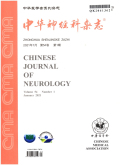胱天蛋白酶募集域蛋白9基因相关侵袭性念珠菌病一例并文献复习
Caspase recruitment domain-containing protein 9 gene deficiency associated invasive candidiasis: a case report and literature review
摘要目的:总结胱天蛋白酶募集域蛋白9(CARD9)基因相关侵袭性念珠菌病的临床特点、诊断及治疗,并报道该基因的一种新突变。方法:描述1例2018年12月底于首都儿科研究所附属儿童医院收入院的以中枢神经系统感染及腹膜后肿物为主要临床表现的侵袭性念珠菌病患儿的临床特征、辅助检查和治疗经过及随访结果,对患儿及其父母进行全基因外显子组检测及一代测序验证从而明确诊断;并以“CARD9”“invasive candidiasis”“侵袭性念珠菌病”为关键词在PubMed数据库、万方数据库、中国知网数据库检索自建库至2020年5月的相关文献,进行文献复习。结果:患儿男性,10岁,既往健康,亚急性病程,以腹泻症状起病,2个月余后病情进展迅速,相继出现头痛、呕吐、抽搐、意识障碍等神经系统受累症状,脑脊液及血液中多次培养出白色念珠菌,大便中找到类酵母样真菌,头部磁共振成像提示梗阻性脑积水,腹部CT可见腹膜后肿物及肠管壁增厚。对患儿及其父母核心家系采血行全基因外显子组检测及一代测序验证,结果发现患儿CARD9基因存在c.952-12_956delinsAG纯合变异,为未报道的致病变异。经静脉联合抗真菌药物治疗症状无明显缓解,行侧脑室引流手术及侧脑室给予抗真菌药物治疗9周,临床症状及脑脊液常规生化改善,培养转阴,腹膜后肿物缩小出院。出院后继续口服联合抗真菌药物治疗4个月,患儿无特殊不适感,体力稍差,脑脊液白细胞及蛋白仍偏高,头部磁共振成像仍可见脑积水及脑室旁白质异常信号,腹部CT可见腹膜后肿物较前缩小。共检索到文献15篇,全世界共报道了21例CARD9基因相关侵袭性念珠菌病患者(不含本例),中枢神经系统感染常见。结论:CARD9基因缺陷患者选择性地对真菌易感,发生侵袭性念珠菌病常累及中枢神经系统,病情重。应予全身足量、长疗程的抗真菌药物治疗,并发脑积水者则需外科治疗。本次报道的新突变丰富了CARD9基因的变异多样性。对不明原因的侵袭性念珠菌病患者,建议行基因检测,关注CARD9基因缺陷等先天性免疫缺陷病。
更多相关知识
abstractsObjective:To summarize the clinical characteristics, diagnosis and treatment of caspase recruitment domain-containing protein 9 (CARD9) gene deficiency associated invasive candidiasis, and report a novel mutation in CARD9 gene.Methods:The clinical characteristics, laboratory tests, treatment and the outcome of follow-up in a boy with invasive candidiasis were described. The boy′s main clinical manifestations were central nervous system infection and retroperitoneal mass. Whole-exome sequencing was performed and Sanger sequencing was verified to identify the CARD9 gene mutations in the patient and his parents. A literature search for “CARD9”and “invasive candidiasis”was conducted in PubMed, Wanfang and CNKI databases from their establishment to May 2020.Results:A 10-year-old boy suffered onset symptom of chronic diarrhea, which lasted for two months. The symptom was followed by progressive neurological symptoms such as headache, vomiting, seizures and disorder of consciousness. His unusual medical history was absent. Candida albicans were cultured several times in cerebrospinal fluid and blood, and yeast-like fungi were found in the stool high power field of vision. Cerebral magnetic resonance imaging indicated obstructive hydrocephalus and abdominal CT scan showed retroperitoneal mass and thickening of the intestinal wall. The whole-exome sequencing analyses of blood samples from the boy and his parents were performed. The results showed that there was a homozygous mutation of c.952-12_956delinsAG in the CARD9 gene, which was an unreported pathogenic mutation. This was confirmed by Sanger sequencing. There was no significant relief from intravenous combined antifungal medications. After lateral ventricular drainage surgery and injection of amphotericin B into the lateral ventricle, improvement of clinical symptoms and cerebral spinal fluid abnormalities was observed after nine weeks, and the retroperitoneal mass shrank. At follow-up after four-month oral combined antifungal medications, the child had no complaint except fatigue. However, cerebral spinal fluid analysis showed increased protein level and decreased glucose. Persistent hydrocephalus and periventricular white matter abnormal signals were revealed on the brain magnetic resonance imaging and the smaller retroperitoneal mass than before on the abdominal CT scan. In addition to this case, totally 21 cases with CARD9 gene deficiency associated invasive candidiasis have been reported worldwide, most of which featured central nervous system infections.Conclusions:CARD9 gene deficiency is an autosomal recessive primary immunodeficiency that confers human susceptibility to fungal disease. The associated invasive candidiasis often affects the central nervous system and makes the patient severely ill. Adequate systemic antifungal therapies should be given, and patients with hydrocephalus need surgical treatment. A novel mutation is reported that expands the variant diversity of CARD9 gene. For patients with unexplained invasive candidiasis, including those without a history of previous recurrent infection, genetic testing is recommended for primary immunodeficiency including CARD9 gene deficiency.
More相关知识
- 浏览237
- 被引1
- 下载137


相似文献
- 中文期刊
- 外文期刊
- 学位论文
- 会议论文



 换一批
换一批 换一批
换一批



